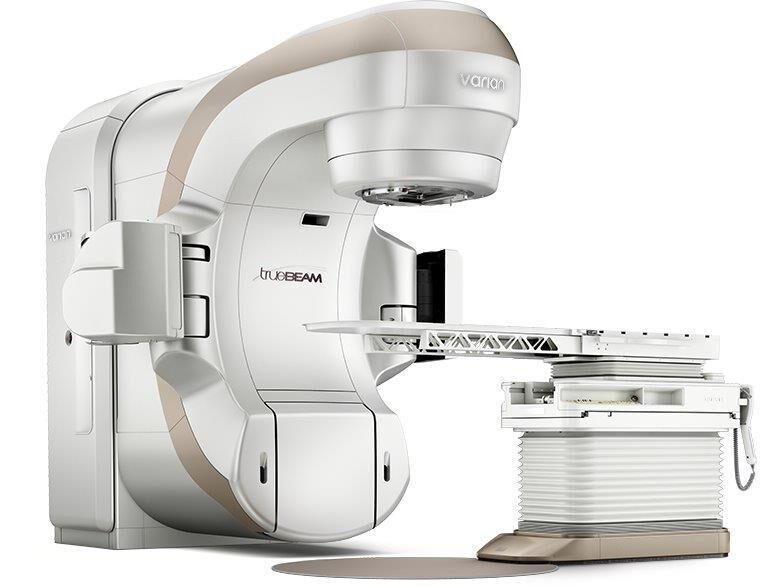Sanford Health is investing in radiation technology that will provide cancer patients state-of-the-art treatment delivered by specialized cancer teams close to home.
Varian linear accelerators are the latest radiation technology and available at the Sanford Cancer Center in Sioux Falls, South Dakota, the Sanford Roger Maris Cancer Center in Fargo, North Dakota, and the Sanford Worthington Cancer Center in Minnesota. Later this summer, another will be ready to treat patients in Bemidji, Minnesota, at the Sanford Joe Lueken Cancer Center.
“What this means for patients is accuracy, speed and comfort,” said Michele Lohr, M.D., a radiation oncologist at Sanford Health in Sioux Falls and Worthington. “What it means for the radiation oncology professionals is the ability to treat many different types of complex cancer cases.”
Linear accelerator in cancer treatment
Sanford Health’s medical minds combine their experience to personalize care based on genetics and cancer type. So what is a linear accelerator, and how does it help improve care?
Varian linear accelerators are devices programmed to deliver high-energy X-rays that conform to the specific size, shape and location of a tumor. They give providers the ability to target and destroy cancerous cells in a precise area of the body, with minimal exposure to surrounding healthy tissue.
It enables care of tumors that can be hard to reach, or are located near critical organs like the heart and lungs. The accuracy of these treatments also permits higher radiation doses because there is a reduced risk of affecting healthy tissue.
By having the capacity to deliver higher dosages and address multiple targets simultaneously, patients can heal in fewer sessions. A tumor that might need 20 to 40 sessions of conventional radiation therapy can be reduced to less than five, for instance. These shorter sessions also lower the risk of side effects in patients.
As an example, Varian linear accelerators offer the required accuracy and imaging capabilities needed for treating multiple brain metastasis. In the absence of this technology, a patient could be looking at more than a half day for treatment. With the help of linear accelerators, however, treatments can be completed in a single 30-minute session.
At Sanford Health, technology allows these types of treatments to be delivered accurately, non-invasively, and much more efficiently.
“It integrates advanced imaging and motion management technologies that makes it possible to deliver treatments more quickly while monitoring and compensating for tumor motion,” Dr. Lohr said. “Before and at any point during a treatment, these linear accelerators can generate the three-dimensional images used to fine-tune tumor targeting, something that wasn’t possible with earlier technologies.”
Better tumor targeting technology
Cancer patients needing this level of treatment can now get it at more locations. The Varian systems will improve on cancer treatment in these areas:
- Precision. The accuracy is measured in increments of less than a millimeter.
- Speed. Some treatments that once took 10 to 30 minutes can now be completed in half the time. Faster treatment delivery not only is more comfortable for patients, requiring less time on the treatment table, but it also reduces the chance of tumor motion during treatment, which helps protect nearby healthy tissue and critical organs.
- Imaging. The imaging technology quickly produces the 3D images used to fine-tune tumor targeting.
- Motion tracking. For lung and other tumors subject to respiratory motion, the linear accelerators offer gating, which makes it possible to monitor the patient’s breathing and compensate for movement of the tumor while radiation is being delivered.
“With the new linear accelerator, we are opening the door to new possibilities for treatment options throughout Sanford Health’s footprint and helping patients receive quality cancer care close to home,” Dr. Lohr said. “Sanford is invested in providing quality cancer care and health care in all our communities.”
Learn more
- Podcast: Determining your breast cancer risk factor
- Podcast: Most-asked questions & answers on screening mammogram
- Doctors teach AI to help spot cancer in image scans
…
Posted In Bemidji, Cancer, Cancer Treatments, Company News, Fargo, Imaging, Rural Health, Sioux Falls, Specialty Care, Worthington
